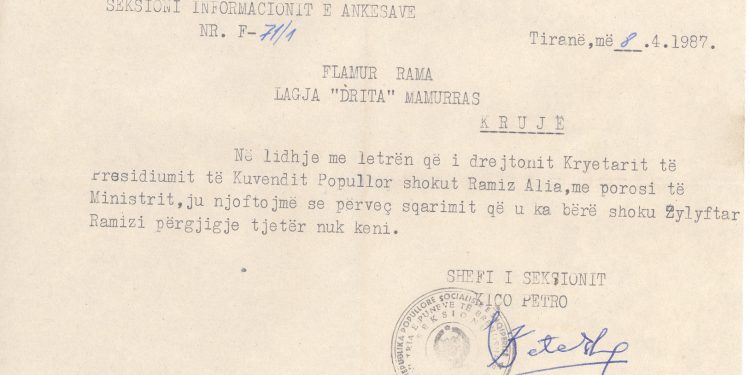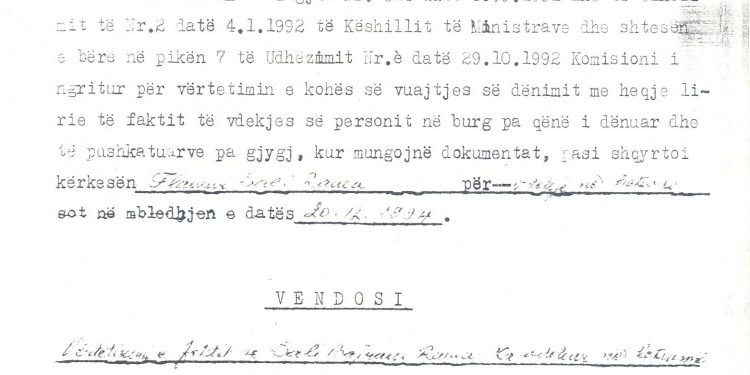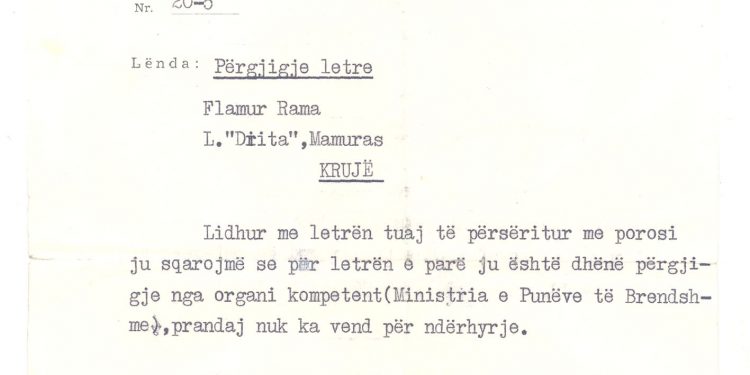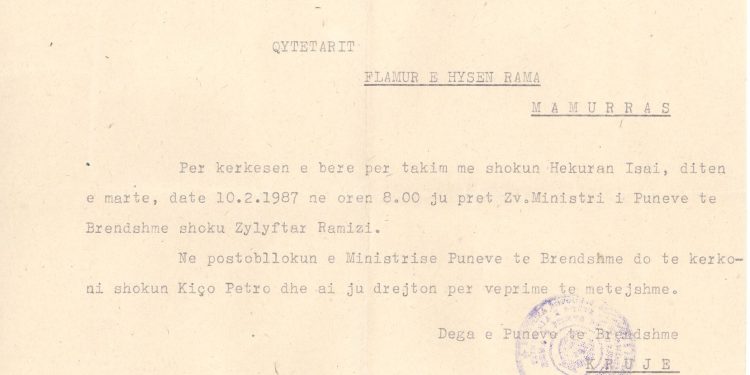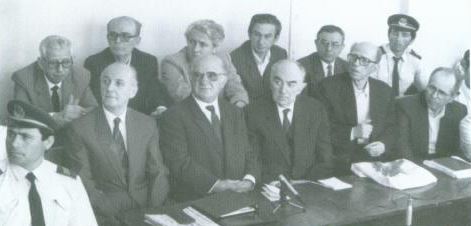Dashnor Kaloçi
Memorie.al publishes the rare testimony of Hysen Bajrami originating from the outskirts of Gjakova and residing in the town of Mamurras since 1954 when they were forced to settle there because of persecutions by the Belgrade Titoist regime. Who were the State Security Officers who reported at home about Sali Bajrami to appear in Tirana, how did the family find out the news of his tragic death, and why did State Security Director Zylyftar Ramizi pressure Sali’s family? Bajrami telling them not to look for him anymore…
On November 17, 1986, at the home of my brother, Sali Eid, a State Security operative came to tell him that the next day he would have to report to the 15-story building in Tirana. The same day, another security operative, Kujtim Kuci, who was serving here in Mamurras, was called in by Sali. Sali told me at dinner when she called me to his house to tell me what the two security officers had told her. The next day, Saliu and the two security personnel traveled to Tirana, which was later confirmed by many of our friends and lovers who had seen them on the train. That night Saliu did not return home and, since we were very worried about what would happen to him, his son, Flag, went to the Kruja Department of Internal Affairs, where Pellumb Kapo told him: “No anything to worry about, Saliu is ill, will be visited and will come home again. ” My nephew, Flag also went to Kruja the next day to inquire about his father, but received no answer. On the third day at dinner some security personnel informed us that Saliu had died after being shot down by a 15-story building and his body was in the Tirana morgue. “The man testifying for Memorie.al is Hysen Bajrami from Mamurras, who recounts that distant 1986 event, when under mysterious circumstances, his brother Saliu died. But who was Sali Bajrami, what was his past, and what circumstances did he come to Albania in 1954 with his brother, Hussein? Why had they initially been interned in the village of Llakatund, Vlora, and for what reason had they refused to return to Kosovo when they were informed by Tirana that Albania had regulated relations with Yugoslavia? Where did the two Kosovar immigrant brothers work and live until 1986 when Sali was dead in completely mysterious circumstances falling from a 15-story building in Tirana, where she was summoned by the State Security? What was Saliu asked by the security officers and was he thrown himself from the eighth floor of the Tirana Hotel or were those thrown at him? Why was Saliu’s body delayed in the Tirana morgue and given to the family only in the final moments before the funeral? Why the State Security opened word that Saliu had been thrown out of the 15-storey, his hatred coming from overseas, and what were the official responses given to Saliu’s brother, Hysen Bajram, by the Kruja Interior Branch, the General Prosecutor’s Office, Police District No.3, Interior Minister Hekuran Isai, People’s Assembly and Secretary of Ramiz Alia? What Prosecutor Arben Qeleshi told Hyseni in 1992 about the mysterious death of Sali Eid and why he was called as a witness to Hysen Bajrami in the trial of Hekuran Isa and Zylyftar Ramiz, which was the response of the former Minister of Interior when Hyseni asked him why. had their brother killed? Concerning these and other facts from that distant 1986 event, Hysen Bajram’s exclusive interview with Memorie.al tells us.
Mr. Hysen, where were you born and what is the origin of your family?
I was born in 1931, in the village of Grecina, which is located in the outskirts of Gjakova in Kosovo, where our family is from.
Has your family been known in that province and what has it been like during your time in Kosovo?
Our family was little known in the outskirts of Gjakova, where we lived, and she was known by the name of our grandfather: the family of Ram Sahiti. During our time in the Greek countryside of Kosovo, our family has been involved in the agricultural work that has provided her with her livelihood.
During the years of Albanian occupation, in 1939-1944, what was the political stance of your family?
During those years, but even earlier, the family of Ram Salih has been known as a nationalist family. In the years of the war, our family became associated with the Anti-Fascist Movement, and during the period when Albanian partisan brigades came to Kosovo, Shefqet Peci was sheltered in our house with his headquarters for some time.
What was the political relationship of your family with Tito’s regime after the war ended?
Given the fact that our family was a nationalist family, shortly after the end of the War in the spring of 1945, we began experiencing difficulties with the Titoist regime. At first we were accused of illegal possession of weapons and we had sheltered Albanians who had fled Albania.
Did you get the conclusions from the accusations made to you?
Following these allegations, we were arrested and put in prison by our uncle Mehmet Rama, who was the vice-president of the National Liberation Council. Mehmet was put on trial and initially sentenced to death, but was later condemned to life. But it was only for demagoguery, as our uncle was executed inside the prison on the pretense of allegedly fleeing. The firing of his uncle, Mehmet, further increased our respect for our family. In 1951, my brother, Sali Bajrami, who was performing compulsory military service, was also arrested. Sali was put on trial and sentenced to one and a half years in prison. Even after Saliu was released from prison there at the beginning of 1953, persecution against our family did not cease, on the contrary, it was further compounded by the retaliation that Rankovic had begun against the Albanian population in Kosovo. Due to this very difficult situation that our family was in at the time, my brother, Sali, and I decided to leave Kosovo and leave here and come to Albania.
How do you remember your departure from Kosovo and coming to Albania?
After deciding to leave, on December 18, 1954, we made our way to Albania. We were three in our family, after Brother Saliu also took his wife, Zelfien. We crossed the border into the village of Dobrune of Has and were held there one night at the border post. The next day we were brought to the town of Kukes, where we were kept for three to four days in the Inner Branch. After that we were accommodated in the hotel and after a few days we were taken to the village of Llakatund, Vlora, where camps for Yugoslav citizens who had arrived in Albania illegally had been set up.
How were you treated at Lacatund and how long did you stay there?
At Lakatund we were treated like all newcomers to Albanian camps were treated. We stayed there for nine months.
Then where did they take you?
Sometime from 1955-1956, one of the envoys of the Central Committee of the LSP dealing with immigration from the former Yugoslavia, told us that the Albanian state had regulated relations with Yugoslavia and whoever wanted could make a request for it. returned to Kosovo. My brother Saliu and his wife refused to make such a request to return to Kosovo, as we knew what had happened to our family there after our escape to Albania. After this situation we acquired Albanian citizenship and stayed here.
What happened to Ram Salihi’s family in Kosovo after your arrival in Albania?
The Titoist regime had arrested our father, Eid, who sentenced him to 12 years in prison. Dad had been in Goli Otok’s prison for eight years and was only released on the verge of death. After doing so, he was sentenced to eight years in prison, and his father was released and he did not live in the home for more than three months, after dying from the many tortures he had done in that prison.
Besides your father, who else lived in Gjakova at that time from your family?
We had two other sisters and three brothers, as well as many relatives.
Where did you get your Albanian citizenship?
We left Lakatundi all three and settled in Bushnesh village near Mamurras, Kruja district. We asked to come here, as it was known that there were many Kosovars in Mamurras who had settled there since 1913, we did not stay there long, because in this village a cooperative was established and we settled in the town of Mamurras.
Where did you work in Mamurras?
In this small town we worked for many years in the enterprise of Bonification, and then Sali moved to the Water Company where he retired.
Before the ’90s, were you able to communicate with the rest of the family in Kosovo?
Since 1954 when we left until 1980 we have not had any exchange letters with our family in Kosovo. In 1972, our brother’s daughter who lived in Kosovo, along with her husband, came as a guest and stayed at our house in Mamurras for two months. She could come here after we made a guarantee.
How do you remember the story of the loss of your brother, Sali?
It was November 17, 1986, when Saliu came to my brother’s house, a State Security operative, and told him to go to the 15th floor in Tirana the next day. On the same day, Saliu had called another State Security operative, Kujtim Kuci, and had given him the same message to appear on the 15th floor the following day.
Did you talk to your brother before heading to your destination, what did he think?
Then, that night, I talked to Sali and asked why they were looking for me at this 15-story meeting? He told me he knew nothing about why they were looking for him, I had and had no connection to any job, either to Security or to anyone else.
Worried about not returning Sali home that night?
We were very worried that Saliu would not return, the next morning, his son Flamuri went to the Kruja Internal Affairs Branch to inquire.
Who did Flag meet, and what did he tell you?
My nephew Flag met at the Interior Branch Pellumb Kapon, who told him “there is nothing to worry about, Saliu is ill and will be visited and then returned home” but that did not happen it happened. Flag returned again to the Kruja Department of Internal Affairs the following day, but received no response.
When you heard the news of Sali’s death, who did they communicate with and what were they told?
I received the news of my brother’s death from some security staff, if I am not mistaken on 19 or 20 November 1986. They told us that Saliu had died after falling from the eighth floor of the 15th floor (Tirana Hotel) and the body his was in the morgue of Tirana.
What was the cause of this tragedy, what did you say?
We were told that Sali had been dumped by the 15-storey, “hashem that came from Kosovo”. No one gave us any other information.
Who went to get Saliu’s body in the morgue?
Saliu’s body went to pick up his son Flag with our three friends: Feriz Gashi, Hasan Mulliqi and Feim Kryeziu. Initially many obstacles were removed and they were not allowed to see Saliu’s body, obstacles were brought there and seven hours were delayed to recover Saliu’s body, which was brought to the apartment a few minutes before the funeral.
How long after Sali’s death did you become interested again and what information did you receive?
40 days after Saliu’s death, I and his son Flamurin went to Tirana and met Zylyftar Ramizi, Deputy Minister of Interior and Director of Security. He told us: “Go to the Kruja Interior Branch, they will explain.” After we got there, the branch president told us, “We don’t know where Sali died, where he died. Ask.” After this answer, we went to the Ministry and there we were told to go to Police District No.3, as there were his documents. After we went to Police District No.3 four times, they didn’t even know anything and only told us that Saliu had been ill”.
What then did you do?
After several visits to the Internal Branch, Region, the Minister, we received no response. After numerous rumors we wrote letters and telegrams to the Minister of the Interior and the Speaker of the People’s Assembly, Ramiz Alia, but again we received no response.
Did you have any pressure to stop “disturbing the state with letters and telegrams” anymore?
Zylyftar Ramizi himself pressured us not to deal with this mystery problem. In 1992 I went to SHIK three times and made two meetings with the Minister of Interior at the time. The Ministry told us to go to the General Prosecutor’s Office, we went and met with Mr. Arben Qelesh, presenting the documents we had. Mr Arben Qelishi told me: “This issue has many problems, this is pure state murder as has happened to many others. When the senior Communist leadership comes to court, so will you. ”
Did you attend the trial of the former communist leaders?
When Hekuran Isa came to court with Zylyftar Ramizi, we were summoned by the General Prosecutor’s Office and I went there with the Flag. Although we tried to question the accused of the communist system, we received no response and this case was closed without answer and responsibility.
How do you personally feel?
I say there are two versions. The first is that Saliu was asked to become a Security Tool and after he refused, they were thrown out of the 15-storey to physically eliminate him and the second Saliu could have been thrown himself for refusing to become a Security Tool. , there may have been various pressures or tortures that he could not handle. However this event has not received and I believe it will not be answered. Memorie.al










